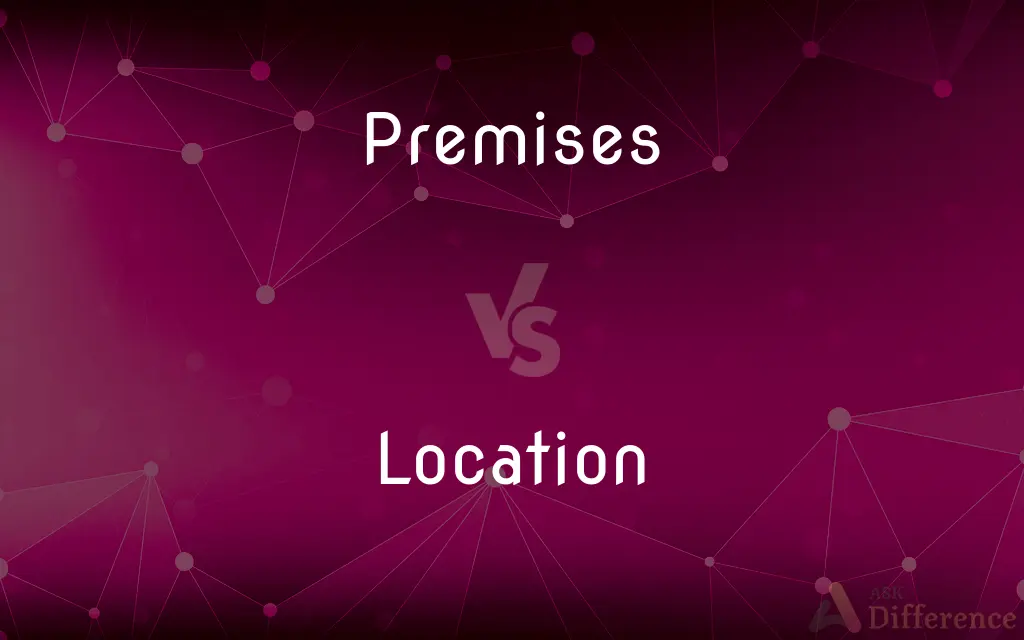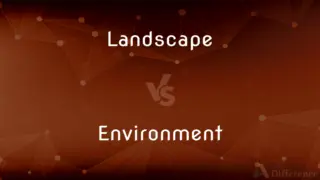Premises vs. Location — What's the Difference?
By Fiza Rafique & Urooj Arif — Updated on March 19, 2024
Premises refer to a building and its surrounding property, emphasizing legal and business contexts, whereas location denotes a specific place or position without implying ownership.

Difference Between Premises and Location
Table of Contents
ADVERTISEMENT
Key Differences
Premises typically encompass not just a building but also its surrounding land, pointing to a specific area owned or occupied by someone, usually in legal or business terms. This term often highlights aspects of property rights and responsibilities. On the other hand, location refers more broadly to a geographical spot or position, which can be detailed by coordinates or a physical address and is not limited by ownership or specific use.
While premises are often discussed in contexts involving legal agreements, insurance policies, or business operations, indicating a controlled area with defined boundaries, location is a more versatile term used across various fields including geography, real estate, and even personal navigation. The concept of location is essential for identifying, finding, or describing places without necessarily considering legal boundaries.
In real estate, the premises are particularly significant when it comes to leases and property transactions, underscoring the physical extent of property involved in the agreement. Locations, however, play a crucial role in assessing the value of property, its accessibility, and its desirability based on geographical factors such as proximity to amenities, views, and neighborhood quality.
The use of premises often implies a sense of permanence or semi-permanence associated with structures and land, suggesting a place of business or residence. Conversely, location can be temporary or changing, such as the current location of a mobile phone or the planned location for an event, reflecting its broader and more flexible usage.
Premises and location also differ in their implication of exclusivity and control. Premises suggest a defined area under the control of a specific entity, often private or commercial, whereas location does not inherently imply control or ownership, merely pointing out a place within a larger context.
ADVERTISEMENT
Comparison Chart
Definition
A building and its surrounding property
A specific place or position
Context
Legal, business
Broad, including geography, real estate
Implication
Ownership, rights
Position, accessibility
Use in Real Estate
Leases, property transactions
Property value, desirability
Flexibility
Less flexible, tied to ownership
More flexible, can refer to any place
Compare with Definitions
Premises
The place where something is situated or occurs.
The event will take place on school premises.
Location
The placement of something.
The strategic location of the cameras provides comprehensive security.
Premises
Legally defined property area.
The security guard patrols the premises at night.
Location
A point or area occupied by a physical entity.
The doctor's office has moved to a new location.
Premises
The land and buildings owned by someone, especially by a company or organization.
The company plans to expand its premises next year.
Location
A particular place or position.
The location of the new office is downtown.
Premises
A building or part of a building.
The bakery occupies the premises previously owned by a bookstore.
Location
A set of coordinates or address.
The app uses GPS to find your location.
Premises
The property used by a business.
No smoking is allowed on the premises.
Location
A place where something happens or is set.
The movie's location shooting took place in New Zealand.
Premises
Premises are land and buildings together considered as a property. This usage arose from property owners finding the word in their title deeds, where it originally correctly meant "the aforementioned; what this document is about", from Latin prae-missus = "placed before".In this sense, the word is always used in the plural, but singular in construction.
Location
In geography, location or place are used to denote a region (point, line, or area) on Earth’s surface or elsewhere. The term location generally implies a higher degree of certainty than place, the latter often indicating an entity with an ambiguous boundary, relying more on human or social attributes of place identity and sense of place than on geometry.
Premises
A proposition upon which an argument is based or from which a conclusion is drawn.
Location
A particular place or position
The property is set in a convenient location
Premises
One of the propositions in a deductive argument.
Location
An area where black South Africans were obliged by apartheid laws to live, usually on the outskirts of a town or city. The term was later replaced by township.
Premises
Either the major or the minor proposition of a syllogism, from which the conclusion is drawn.
Location
The act or process of locating
Location of the lost hikers took two days.
Premises
Land, the buildings on it, or both the land and the buildings on it.
Location
A place where something is or could be located; a site.
Premises
A building or particular portion of a building.
Location
A site away from a studio at which part or all of a movie is shot
Filming a Western on location in the Mexican desert.
Premises
(Law) The part of a deed that states the details of the conveyance of the property.
Location
A tract of land that has been surveyed and marked off.
Premises
To provide a basis for; base
"The American Revolution had been premised on a tacit bargain that regional conflicts would be subordinated to the need for unity among the states" (Ron Chernow).
Location
A particular point or place in physical space.
Premises
To state or assume as a proposition in an argument.
Location
An act of locating.
Premises
To state in advance as an introduction or explanation.
Location
(South Africa) An apartheid-era urban area populated by non-white people; township.
Premises
Plural of premise
Location
(legal) A leasing on rent.
Premises
(plural only) land, and all the built structures on it, especially when considered as a single place.
Location
A contract for the use of a thing, or service of a person, for hire.
Premises
The subject of a conveyance or deed
Location
The marking out of the boundaries, or identifying the place or site of, a piece of land, according to the description given in an entry, plan, map, etc
Premises
Land and buildings together considered as a place of business;
Bread is baked on the premises
Location
(Kenya) An administrative region in Kenya, below counties and subcounties, and further divided into sublocations.
Location
The act or process of locating.
Location
Situation; place; locality.
Location
That which is located; a tract of land designated in place.
Location
A leasing on rent.
Location
A point or extent in space
Location
The act of putting something in a certain place or location
Location
A determination of the location of something;
He got a good fix on the target
Common Curiosities
Is location always specific to geography?
Location is broadly used to indicate a place or position, which can be specific to geography but also refers to positions within larger entities.
Why is the concept of premises important in business?
Premises are important in business for legal reasons, including leases, insurance, and liability, indicating the physical extent of the business's property.
Can the term "premises" refer to virtual spaces?
Traditionally, premises refer to physical spaces, but with the rise of digital technology, the term can loosely describe virtual spaces in certain contexts.
What role does location play in marketing?
Location plays a crucial role in marketing, influencing how products or services are promoted based on regional preferences and accessibility.
Can the term "location" imply ownership?
Location itself does not imply ownership; it simply specifies a place or position.
Are premises always used for commercial purposes?
Premises can be used for commercial, residential, or mixed purposes, depending on the context.
How do premises relate to property insurance?
Property insurance policies often cover specific premises, detailing the extents of coverage for buildings and surrounding land.
What is the difference between premises and location?
Premises refer to a building and its surrounding land, often in a legal or business context, while location denotes a specific place or position without implying ownership.
How do premises and location differ in legal contexts?
In legal contexts, premises are specifically about property rights and ownership, while location can refer to any place relevant to the legal matter.
Does the value of premises depend on its location?
Yes, the value of premises can significantly depend on its location due to factors like accessibility, desirability, and proximity to amenities.
Can a location change over time?
Yes, the description of a location can change due to developments or natural changes, though its geographical coordinates remain constant.
Can premises include multiple buildings?
Yes, premises can include multiple buildings and the land on which they stand.
What makes a good business location?
A good business location is accessible, visible, and situated in a community that supports the business's market.
Is it possible for premises to not have a fixed location?
Premises typically have a fixed location, but mobile businesses, like food trucks, challenge this notion with their changing locations.
How does the concept of location impact real estate?
Location impacts real estate by affecting property values, desirability, and strategic importance based on geographical and community factors.
Share Your Discovery

Previous Comparison
Baseball vs. Hardball
Next Comparison
Landscape vs. EnvironmentAuthor Spotlight
Written by
Fiza RafiqueFiza Rafique is a skilled content writer at AskDifference.com, where she meticulously refines and enhances written pieces. Drawing from her vast editorial expertise, Fiza ensures clarity, accuracy, and precision in every article. Passionate about language, she continually seeks to elevate the quality of content for readers worldwide.
Co-written by
Urooj ArifUrooj is a skilled content writer at Ask Difference, known for her exceptional ability to simplify complex topics into engaging and informative content. With a passion for research and a flair for clear, concise writing, she consistently delivers articles that resonate with our diverse audience.














































